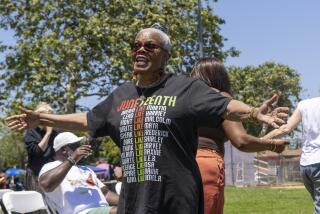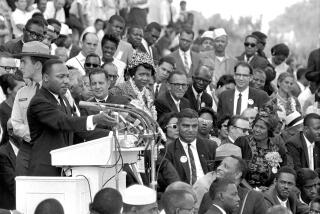Historic Document Stirs Emotions : Civil rights: NAACP members celebrate Emancipation Proclamation 130 years after it ended slavery in the American South.
- Share via
The original--five fragile sheets of paper--is on display only through today in Washington, D.C.
But 130 years after the Emancipation Proclamation was issued, the feelings it still stirs were vivid and durable in Pacoima on Sunday, as more than 250 people celebrated the anniversary of the document that ended slavery in the American South, and paved the way to outlawing slavery altogether.
“We can quote a famous advertisement and say, ‘Baby, we have come a long way,’ ” Sophia Williams, a retired Lake View Terrace teacher, told the crowd that filled the pews of the Calvary Baptist Church. “Let us celebrate our progress, yet realize that the struggle continues.”
Williams, a member of the San Fernando Valley branch of the National Assn. for the Advancement of Colored People, spoke at the chapter’s 15th annual Jubilee Day--its first major event each year.
The joyful strains of an exuberant choir and emotional remarks honoring those who died in the struggle for freedom brought the participants, representing churches from across the San Fernando Valley, to celebrate Abraham Lincoln’s proclamation, issued on New Year’s Day 1863.
“The word jubilee is derived from the word jubilant, which means to rejoice,” Williams told the mostly African-American audience, which cheered during a rousing rendition of the national anthem and again when a local clergyman read the proclamation aloud.
(The original, on public display for the first time in years, was exhibited over the holiday weekend at the National Archives for only 40 hours, in honor of its anniversary. The document, written on poor-quality paper, is too fragile to keep on permanent exhibit.)
But Williams also urged the crowd to “take an inventory” of the battle for equality since then, and the zestful revivalist flavor of the event was tempered by speakers who noted the tragedies of 1992: the Los Angeles riots, and sobering social and economic realities that threaten to reverse the gains African-Americans have made.
They noted a prison system with what they called a disproportionate number of black inmates, as well as a national unemployment rate of nearly 41% for blacks between 16 and 24.
As listeners chorused “Yes,” Los Angeles Municipal Judge Marion Johnson said that the disintegration of the family, a destructive legacy of self-hatred among many blacks and ongoing discrimination must be stopped.
“We must develop an alternative to the criminal justice system and the warehousing of so many members of our next generation. We must teach our youngsters self-worth, pride and dignity. . . . We all must become involved,” said Johnson, who offered his help to anyone in the audience needing it.
The judge, urging young people to persevere in their education, praised the example of Malaika Abdullah, a senior at Cleveland High School in Reseda, who received a standing ovation Sunday for a reading of her composition on the Emancipation Proclamation and the struggle for civil rights.
“We are getting closer every day,” she told the crowd.
“Who can cast a vote? I can.”
More to Read
Sign up for Essential California
The most important California stories and recommendations in your inbox every morning.
You may occasionally receive promotional content from the Los Angeles Times.













